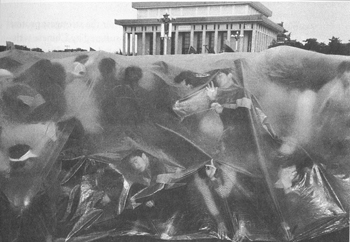|
FEATURES
Confession, Redemption and Death | China Heritage Quarterly
Confession, Redemption and Death
Geremie R. Barmé

[Students in Tiananmen Square, May 1989. From Geremie Barmé and Linda Jaivin, eds, New Ghosts, Old Dreams, Chinese voices of protest, New York: Times Books, 1992.]
The following essay, written in 1990, was published in 1991 in George Hicks (ed.), The Broken Mirror: China After Tiananmen, London: Longmans, 1990, 52-99. Given the fact that 2009 is the anniversary of the tumultuous events of the spring-summer of 1989, and that the protagonist of this discussion of 'confession, redemption and death' has featured in the international media since 1988, it seems appropriate to make this text available in electronic form. Other relevant material can be found in New Ghosts, Old Dreams: Chinese Rebel Voices, edited by Geremie Barmé and Linda Jaivin (New York: Times Books, 1992); and, Barmé, In the Red, on contemporary Chinese culture (New York: Columbia University Press, 1999), as well as in the film The Gate of Heavenly Peace (Boston: Long Bow Group, 1995) and the site related to the film: www.tsquare.tv.
The essay, downloadable here in PDF format, starts with the following paragraph:
From1988 to early 1989, it was a common sentiment in Beijing that China was in crisis. Economic reform was faltering due to the lack of a coherent program of change or a unified approach to reforms among Chinese leaders and ambitious plans to free prices resulted in widespread panic over inflation; the question of political succession to Deng Xiaoping had taken alarming precedence once more as it became clear that Zhao Ziyang was under attack; nepotism was rife within the Party and corporate economy; egregious corruption and inflation added to dissatisfaction with educational policies and the feeling of hopelessness among intellectuals and university students who had profited little from the reforms; and the general state of cultural malaise and social ills combined to create a sense of impending doom. On top of this, the government seemed unwilling or incapable of attempting to find any new solutions to these problems. It enlisted once more the aid of propaganda, empty slogans, and rhetoric to stave off the mounting crisis....more [pdf]
|
